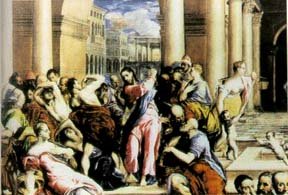Stop making my Father’s house a marketplace. ( Jn 2:13-25 )

He found in the temple area those who sold oxen, sheep, and doves, as well as the money changers seated there.
This was the outer Court of the Gentiles. Beyond this no gentile may cross at the pain of death.
Merchants were there for the convenience of the pilgrims who could not possibly bring animals along.
The money-changers were a necessity since Jews would not use pagan money to buy the animal sacrifices.
Stop making my Father’s house a marketplace.
By saying "my Father's house", Jesus shows a special relationship with the Father.
Jesus was protesting the lack of respect for the sanctity of the temple.
Zeal for your house will consume me.
This comes from Psalm 69 which was always thought of as applying to the Messiah. Jesus is, therefore, being hinted as the Messiah.
The clearing of the temple was one more reason for the hostility of the Jews towards Jesus and would bring him closer to his death.
What sign can you show us for doing this?
In the gospel of John, the Jews continuously ask for a miracle which Jesus would refuse to give. Miracles were for those who were ready to receive them.
Destroy this temple and in three days I will raise it up.
This statement of Jesus was used against him in a twisted way when he was brought before the Sanhedrin.
This temple has been under construction for forty-six years.
The construction was begun in 20 or 19 BC. This incident, therefore, took place in 28 AD. The temple was not completed in Jesus' time. It was finished around 63 or 64 AD. And then destroyed by the Romans in 70 AD and never rebuilt to the present day.
But he was speaking about the temple of his body.
The temple was holy because it was God's dwelling place. Now with the coming of Jesus the temple is no longer needed. It has been replaced by Jesus in whom we can find God because he is truly God.
Jesus would not trust himself to them because he knew them all.
A faith based merely on miracles and not in the one who performs them will prove unstable. In fact, the very ones who welcomed Jesus as Son of David were the ame ones to cry out: "Crucify him!"
OF CHAPELS AND CHURCHES
When the liturgy is not being celebrated, the silence that pervades the building not only creates the climate for prayer but proclaims the praying that is going on inside.
When we enter the chapel, we make the sign of the cross (with holy water, if available). It is both a reminder and a acknowledgment that we entering a sacred space.
When the Blessed Sacrament is kept in the tabernacle, the genuflection (or in some places, a deep bow) becomes a homage and adoration to Jesus who is truly present.
Chapels and Churches are truly the House of God. But they are also the House of the People of God assembled for worship. In fact, the word church does not only refer to a building but to the body of believers. That is why going to a chapel or to a church is like going home. It is the Father's house. But it is also ours.
No comments:
Post a Comment